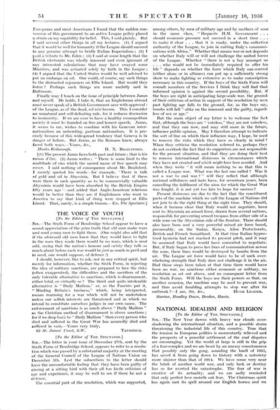[To the Editor of THE SPECTATOR.]
SIR,—The letter in your issue of December 27th, sent by the Sixth Form of Bembridge School, appears to refer to a resolu- tion which was passed by a substantial majority at the meeting of the General Council of the League of Nations Union on December 5th. Lest the subscribers to the letter should have the uncomfortable feeling that they have been guilty of aiming at a sitting bird with their all too facile criticism of age and experience, it may be well to see if there be not a defence.
The essential part of the resolution, which was supported, among others, by men of military age and by mothers of sons in the same class, " Requests H.M. Government . . .
should economic pressure not succeed in a short time . . .
to make it clear . . . that it is ready, under the collective authority of the League, to join in cutting Italy's communi- cations with Africa." Whether that means war or not depends on whether Italy will or will not challenge the united forces of the League. Whether " there is not a boy amongst us . . . who would not be immediately required to offer his life " depends on whether the force which Italy can control (either alone or in alliance) can put up a sufficiently strong show to make fighting so extensive as to make conscription necessary in this country. If the boys of the Sixth Form will consult members of the Services I think they will find that informed opinion is against the second possibility. But, if the boys are right in anticipating large-scale war, the ground of their criticism of action in support of the resolution by men past fighting age falls to the ground, for, as the boys say, bombs will fall " alike on the innocent and the guilty, regard- less of sex or age."
But the main object of my letter is to welcome the fact that, although the boys are " voteless," they are not voiceless, and that they can now, and may still more in the future, influence public opinion. May I therefore attempt to indicate the sort of line on which their influence may, I hope, be used to remove the risks which they have so clearly in mind ? When they criticise the resolution referred to, perhaps they do not overlook the fact that its supporters are not responsible for the present situation, and that they are doing their best to remove international distresses in circumstances which they have not created and which might have been avoided. And when they write " it will mean nothing to us that this is called a League war. What was the last one balled ? Was it not a war to end war ? " will they reflect that although national selfishness and hate have, for seventeen years, been cancelling the fulfilment of the aims for which the Great War was fought, it is not yet too late to hope for success ?
Present distresses are due to the fact that the constituent parts of the machine which we call the League of Nations 'did not join to do the right thing at the right time. They should, when it became clear that Italy would not negotiate, have sent to Abyssinia an armed force, drawn from several nations, responsible for preventing armed trespass from either side of a wide zone on the Abyssinian side of the frontier. There should also have been sent a very powerful mixed air force based, presumably," on the Sudan, Kenya, Aden Protectorate, British and French Somaliland. At that time" Italian hypno- tised hysteria had not reached its present pitch, and it may be assumed that Italy would have consented to negotiate. But, if Italy began to press her lines of communication across the zone, these lines would be destroyed by bombs from the air. The League air • force would have to be of such over- whelming strength that Italy dare not challenge it in the air. Had those steps been taken at that time there would have been no war, no sanctions . either economic or military, no resolution as set out above, and no consequent letter from the Sixth Form. Will the boys use their powers so that, on another occasion, the machine may be used to prevent war, and thus avoid fumbling attempts to stop war after its outbreak ?—I am, Sir, &c., HUGH LEADER. Stanton, Headley Down, Bordon, Hants.










































 Previous page
Previous page